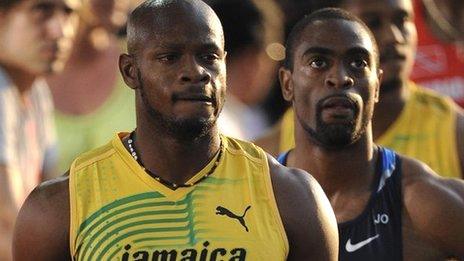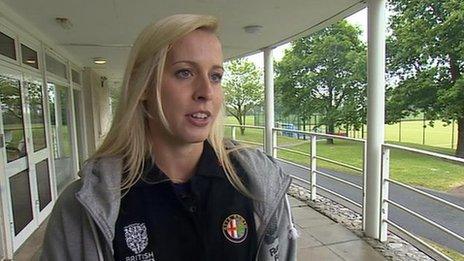Eilidh Child urges lifetime ban for athletics drug cheats
- Published
Interview - Scottish athlete Eilidh Child
Scottish Commonwealth silver medallist Eilidh Child insists issuing lifetime bans is the most effective way to deter drug cheats.
Tyson Gay and Jamaica's ex-100m world record holder Asafa Powell failing drug tests has triggered fresh debate.
American Gay said he had been let down by someone he trusted, while Powell said he never knowingly doped., external
Child, a 400m hurdler, believes the standard two-year ban for athletes who take drugs is insufficient.
Gay, the joint-second fastest man ever over 100m, was told by the US Anti-Doping Agency on Friday that his A sample from an out-of-competition test in May was positive.
His fellow 30-year-old Powell, the all-time fourth quickest man over 100m, tested positive for a banned stimulant at June's Jamaican Championships.
Both are now awaiting the results of B samples.
Child, 26, expressed shock at the news, but stressed the sport would emerge stronger.
"The system seems to be working now and people are being caught," she told BBC Scotland. "No matter how high-profile your name is, you are getting caught.
"Hopefully, in the long run it's going to be better for our sport and it will be a level playing field.
"It's a real shame for athletes who are doing exceptionally well and are clean. But, as an athlete, you've got to step on the starting line and imagine that everyone you're running with is clean."
Asked about sanctions for athletes found guilty, the Delhi 2010 silver medallist added: "It's got to be a lifetime ban. People have spoken about it before but there does need to be that deterrent to put anyone on the verge of thinking about it, completely off.
"A couple of years (ban) isn't that much and is enough to get back into another Games. For me, that can be a bad injury for some athletes who can be out for a couple of years and come back after that.
"So, it does really need to be a lifetime ban so that people who think about it are completely put off because they know that they're not going to get back into their sport after it."
- Published15 July 2013

- Published27 June 2013

- Published10 September 2015
